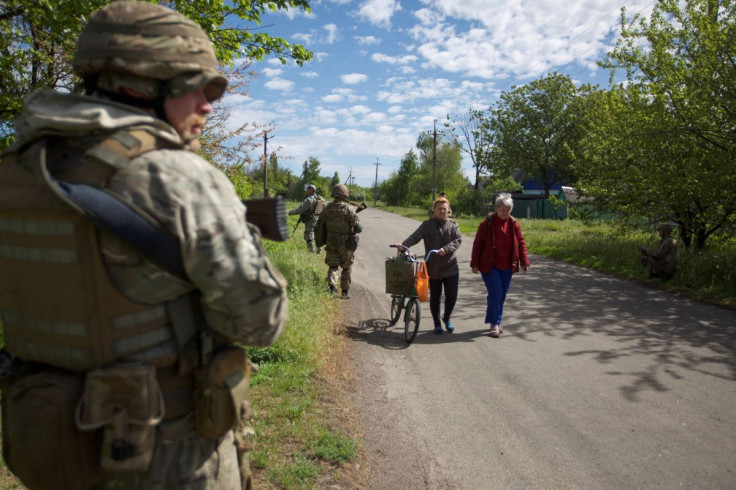Russia Assaults Sievierodonetsk Wasteland, Extends Gas Cuts To Europe

Ukrainian forces were holding out in the eastern industrial city of Sievierodonetsk on Tuesday, resisting Russia's all-out assault to capture a bombed-out wasteland that Moscow has made the principal objective of its invasion.
Both sides said Russian forces now controlled between a third and half of the city. Russia's separatist proxies acknowledged that capturing the city was taking longer than hoped, despite one of the biggest ground assaults of the war.
Russia, responding to Western sanctions after its Feb. 24 invasion of Ukraine, widened its gas cuts to Europe on Tuesday with Gazprom saying it would cut supplies to several "unfriendly" countries which have refused to accept Moscow's roubles-for-gas payment scheme..
EU leaders agreed overnight to cut imports of Russian oil by 90% by year-end, the bloc's toughest yet response. Ukrainian President Volodymyr Zelenskiy welcomed the move but criticised what he called an "unacceptable" delay.
"When over 50 days have passed between the fifth and sixth sanction packages, the situation is not acceptable for us," Zelenskiy said, speaking alongside Slovakian President Zuzana Caputova in Kyiv.
Western military analysts say Moscow has drained manpower and firepower from across other parts of the front to concentrate on Sievierodonetsk, hoping a massive offensive will achieve one of its stated aims, to secure surrounding Luhansk province for separatist proxies.
"We can say already that a third of Sievierodonetsk is already under our control," Russia's TASS state news agency quoted Leonid Pasechnik, the leader of the pro-Moscow Luhansk People's Republic, as saying.
Fighting was raging in the city, but Russian forces were not advancing as rapidly as might have been hoped, he said, claiming that pro-Moscow forces wanted to "maintain the city's infrastructure" and moved slowly because of caution around chemical factories.
A Russian air strike hit a nitric acid tank, Luhansk governor Serhiy Gaidai said on Tuesday. In a post on the Telegram app, he urged local residents not to leave bomb shelters because of the risk posed by toxic fumes.
In its evening briefing note on Facebook, Ukraine's military command said that Russian forces were "attempting to take full control of Sievierodonetsk" and surround Ukrainian units fighting there.
"Unfortunately ... the city has been split in half. But at the same time the city still defends itself. It is still Ukrainian," the head of the city administration, Oleksandr Stryuk, said, advising those still trapped inside to stay in cellars.
Ukraine says Russia has destroyed all of the city's critical infrastructure with unrelenting bombardment, followed by wave after wave of mass ground assaults involving huge numbers of casualties.
Thousands of residents remain trapped. Russian forces were advancing towards the city centre, but slowly, regional governor Gaidai said.
Gaidai said there did not appear to be a risk of Ukrainian forces being encircled, though they could ultimately be forced to retreat across the Siverskyi Donets river to Lysychansk, the twin city on the opposite bank.
Stryuk, head of the city administration, said evacuating civilians was no longer possible.
Jan Egeland, secretary general of the Norwegian Refugee Council aid agency which had long operated out of Sievierodonetsk, said he was "horrified" by its destruction.
"We fear that up to 12,000 civilians remain caught in crossfire in the city, without sufficient access to water, food, medicine or electricity," he said. "The near-constant bombardment is forcing civilians to seek refuge in bomb shelters and basements, with only few precious opportunities for those trying to escape."
Elsewhere on the battlefield, there were few reports of major shifts. In the east, Ukraine says Moscow is trying to assault other areas along the main front, regrouping to press towards the city of Sloviansk. In the south, Ukraine claimed in recent days to have pushed back Russian forces to the border of Russian-held Kherson province.
OIL BAN
After failing to capture Kyiv and being driven out of northern Ukraine, victory in Sievierodonetsk and across the river in Lysychansk would bring full control of Luhansk, one of two eastern provinces Moscow claims on behalf of separatist proxies.
"(President Vladimir) Putin is now hurling men and munitions" at Sievierodonetsk, "as if taking it would win the war for the Kremlin. He is wrong," the Washington-based Institute for the Study of War think tank wrote this week.
The EU said it will ban imports of Russian oil by sea. Officials said that would halt two-thirds of Russia's oil exports to Europe at first, and 90% by the end of this year as Germany and Poland also phase out imports by pipeline.
But Hungary, which relies on Russian oil through a huge Soviet-era pipeline, secured an exemption.
Putin launched his "special operation" in February to disarm and "denazify" Ukraine. Ukraine and its Western allies call this a baseless pretext for a war to seize territory.
Ukraine accuses Moscow of war crimes on a huge scale, flattening cities and killing and raping civilians. Russia denies the accusations.
In the second war crimes trial to be held in Ukraine, two Russian soldiers were jailed on Tuesday for 11-1/2 years after pleading guilty to shelling civilian targets. Ukraine's top prosecutor said Kyiv has identified more than 600 Russian war crime suspects and started prosecuting around 80.
© Copyright Thomson Reuters {{Year}}. All rights reserved.





















